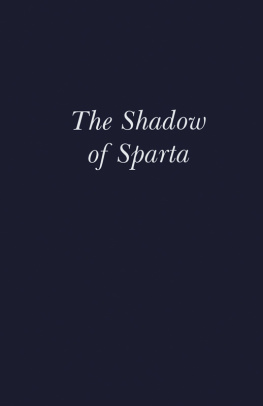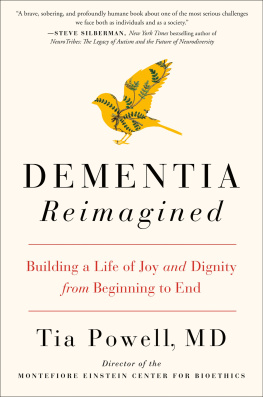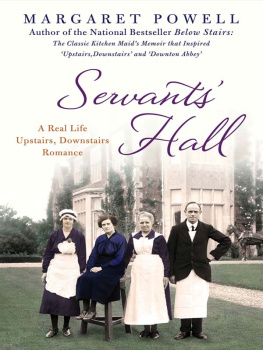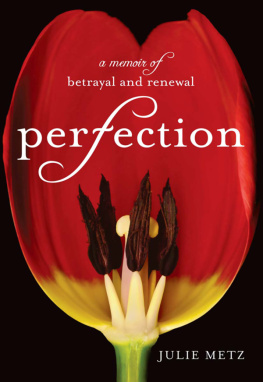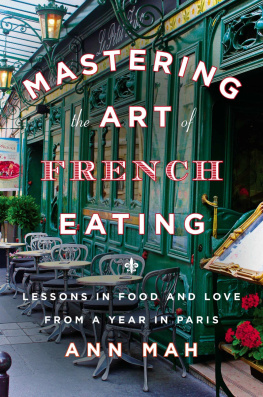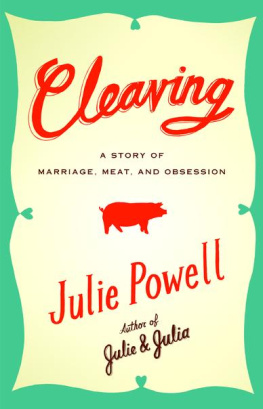ALSO BY JULIE POWELL
Julie and Julia
Copyright (c) 2009 by Julie Powell
All rights reserved. Except as permitted under the U.S. Copyright Act of 1976, no part of this publication may be reproduced, distributed, or transmitted in any form or by any means, or stored in a database or retrieval system, without the prior written permission of the publisher.
Little, Brown and Company
Hachette Book Group
237 Park Avenue, New York, NY 10017
Visit our website at www.HachetteBookGroup.com
www.twitter.com/littlebrown
First eBook Edition: December 2009
The names and identifying characteristics of some characters (persons) in this book have been changed.
Little, Brown and Company is a division of Hachette Book Group, Inc. The Little, Brown name and logo are trademarks of Hachette Book Group, Inc.
"Designs on You" by Old 97's. Copyright (c) 2001: Songs Music Publishing, LLC o/b/o Ram Island Songs (ASCAP), Burgermeister Music (ASCAP), Pennycost Music (ASCAP), This Is My Piece of Sheet Music (ASCAP), Wait Till Next Year Music (ASCAP). Reprinted by permission of Songs Music Publishing, LLC.
"Red Right Ankle." Written by Colin Meloy. Copyright (c) Music of Stage Three o/b/o itself and Osterozhna! Music (BMI). All rights reserved. Used by permission.
"Willin'." Copyright (c) 1994. Written by Lowell George of Little Feat. Lyrics reprinted with permission.
ISBN: 978-0-316-05448-5
For Josh and Jessica,
who have the hearts of true butchers--
tough, generous, and enormous
It's the memoirist's privilege to tell her version of a many-faceted story; and any one facet may necessarily be incomplete, fractured, or polished to a sheen that the original stuff of experience didn't possess. Cleaving is a book that is faithful to my heart, but occasionally fuzzy on the odd physical detail. Other participants in the events recounted in these pages undoubtedly remember things differently; from them, and from the reader, I ask for a bit of patience and understanding.
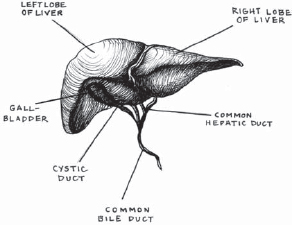
February 13, 2008
THIS IS REALLY not what it looks like.
The work is most often a delicate thing, and bloodless. In the year and more that I've been doing this, I've gone whole days with no more evidence of my labors by evening than a small bit of gore on my shoes or a sheen of translucent fat on my hands and face (it's excellent for the skin, I'm told). So this is unusual, this syrupy drip, my arms drenched up to the elbows, my apron smeared with crimson going quickly to brown.
I reach down into the plastic-lined cardboard box one more time, coming up with an organ weighing probably fifteen pounds, a dense and slippery deadweight, a blood-soaked sponge. I slap it onto the cutting table, and it makes a sound like a fish flopping on the deck of a boat; the risk of dropping it on the floor is not inconsiderable. The box is deep, and when I reach to the bottom of it my face brushed up against the bloody lining. Now I can feel a streak of the stuff drying stickily across my cheekbone. I don't bother to wipe it off. On what clean surface would I wipe it, after all? Besides, it makes me feel rather rakish.
I take my scimitar from the metal scabbard hanging from a chain around my waist. For most work I use my boning knife, an altogether smaller, finer thing, six inches long, slightly curved, with a dark rosewood hilt worn to satin smoothness by all the fat and lanolin that has been massaged into it. That little knife cracks open a haunch joint or breaks down muscle groups into their component parts like nothing else. But with this heavy, foot-long blade I can, while pressing firmly down on the flesh with my right palm, slice straight through the liver in one dragging stroke. Thin, even slices. With the boning knife I'd have to saw away to get through that bulk of organ meat, making for torn, jagged edges. And you wouldn't want that. You want the blade to slip through easily. Smooth. Final.
More than a year ago, when I first told my husband, Eric, that I wanted to do this, he didn't understand. "Butchery?" he asked, an expression of mystification, perhaps even discomfort, screwing up his face.
His suspicion hurt me. There was a time, just a few years before, when there was no trace of it in his heart. I knew I deserved it. But it was just so strange to have to try to explain; strange to have to explain anything to Eric at all. I'd known him by then for sixteen years, almost literally half my life. I knew him when he was a beautiful, shy, blue-eyed teenager in baggy shorts, a stretched-out sweater, and worn Birkenstocks, with a dog-eared paperback jutting out of one rear pocket. And almost at the beginning I picked him out, decided he was the one I needed. It took most of a school year to snatch him from the swarm of pretty girls that seemed always to be circling--he so oblivious, he so sweet and gentle--but I managed it. God, I was invincible when I was eighteen. When it came down to it, I got pretty much whatever I went after. Want. Take. Have. That was my simple motto. And I was right--to take him, I mean. From the beginning we were interlocking puzzle pieces. From the beginning we nestled into the notion that our two lives were to be irrevocably woven into one.
I now slice off eight pretty burgundy flaps of liver. The cut organ releases a metallic tang into the air, and yet more blood onto the table. Changing knives now, I delicately excise the tight pale ducts that weave through the slices. Perfectly cooked liver should be crisp on the outside with a custardy-smooth center. Nothing tough or chewy should get in the way of that sensual quintessence. Six of these slices are for the gleaming glass and steel case at the front of the shop; the last two I set aside, to wrap up and take home after work for a Valentine's Day dinner tomorrow. Once, I thought the holiday merited boxes of chocolate and glittery cards, but in these last couple of eye-opening years, amid the butchery and wrenches of the heart, I've realized life has gotten too complicated for such sweet and meaningless nothings; I've even learned I'm okay with that.
VALENTINE'S DAY LIVER FOR TWO
1/2 cup flour
21/2-inch-thick slices high-quality beef liver, trimmed of any tough veins or filament
Salt and pepper to taste
2 tablespoons butter
1 tablespoon extra-virgin olive oil
Spread flour on a large plate. Season the liver slices with salt and pepper, then dredge in the flour, shaking off excess.
Set a skillet over high heat, and add butter and oil. When the butter foam has just subsided, add the liver slices. Saute just until a crispy golden brown crust develops, about two minutes. Flip the slices and do the same on the other side. (Don't worry about undercooking. Overcooking is by far the worse fate for liver.)
Beef liver cooked like this--I keep telling people in the face of near-universal scoffs of disbelief--is one of the most, well, passionate things you'll ever eat. I don't know exactly why this is. It's as sexy as hell, but difficult too. Somehow faintly forlorn, like there is no denying that something was torn from something for your pleasure.
Eric and I married young, but that doesn't mean our union was precipitous. We'd already known each other for seven years by the time I donned that white organza princess gown and walked along that stone path on my father's arm to the bubbly notes of "My Baby Just Cares for Me." We could look right down to the bottom of each other and see what was swimming there, like fish flashing in clear mountain lakes. At our center wasn't sexuality or ambition, though we shared both. No, deep understanding, that's what we had. The nagging voice I've all my life heard in my head, the one people might call addiction or restlessness or waywardness, but which is to me almost an embodiment, some thing outside of myself, impish, far from benign, but also inspiring and not entirely unconcerned with my self-interest--Eric believed in it. He feared it sometimes, but he believed in it. In 2002, when I turned twenty-nine, and we were living in Brooklyn, and I was stuck in yet another in a long line of ill-paid, dead-end jobs, loving my husband--clinging to him, in fact, as the sole solace in a world that I figured by and large didn't have much use for me--but unhappy and beginning to feel I just didn't in fact have much of a talent for happiness, Eric understood that when the voice spoke to me I had to listen.
Next page

